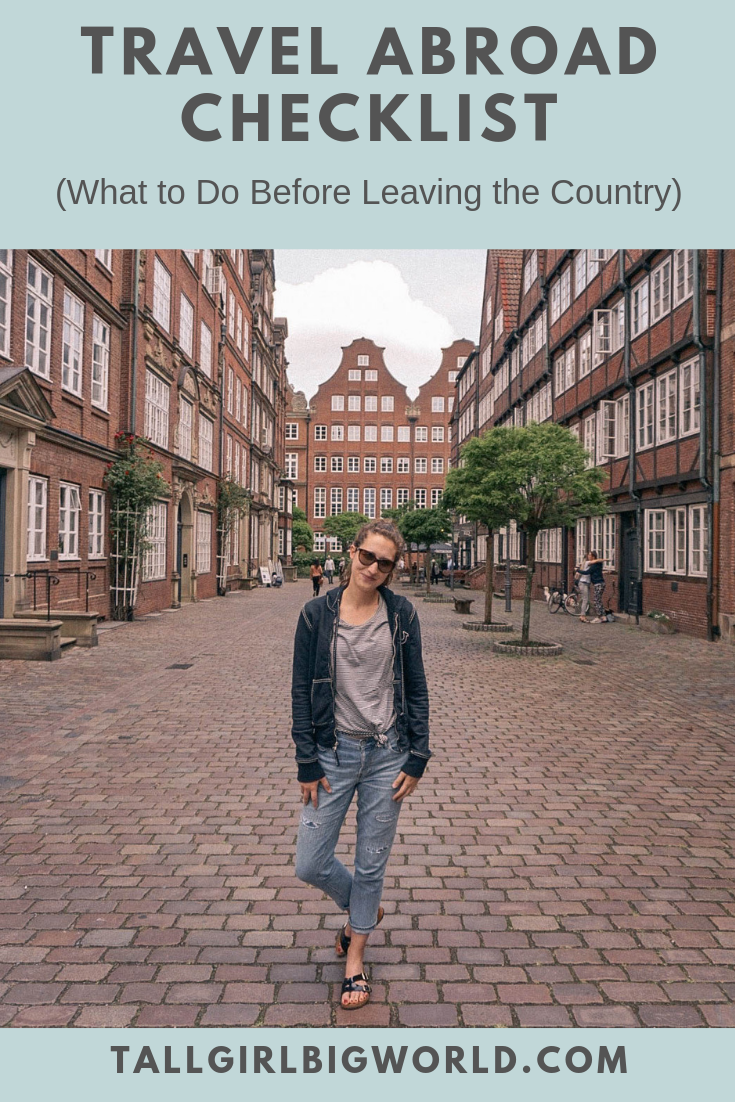Planning a big trip and not sure where to start? This traveling abroad checklist outlines the 16 key things you MUST do before leaving the country.

As I’m writing this post, I’m actually on an overseas trip of my own! I’m currently typing this in the Lisbon airport — I have a long layover on my way to Germany and wanted to share a few things I always do in preparation for a big trip like this (if you didn’t know I’m moving to Germany, now you know!). I originally put this traveling abroad checklist together a couple years ago before my first big solo trip overseas, but since writing that original post I’ve learned a few more key things to do before traveling abroad. Since I’m currently en route to Germany and will be taking many international trips in the near future, I wanted to jot down all of the essential things do before going overseas so that they’re all in one place for me (and you!) to easily reference. The following list shares 16 key things you need to do before leaving the country to ensure your trip goes smoothly. If there’s anything you think I should add to this list, please let me know in the comments below!
1. Book Your Hotel
I’m actually so bad about booking accommodations. I’m the person who puts off booking a hotel until the month before I’m set to depart, which is an expensive mistake 9 times out of 10. I think I put off finding a place to stay because I’m so excited to have booked my flight early, and then I tell myself there’s plenty of time to book a hotel, so it’s fine to wait a bit…but then I forget about it entirely. Learn from my mistakes, and immediately start looking for hotels once you’ve booked your flight. Grab the best deal you can before prices skyrocket in the month or so before you’re set to travel. I personally enjoy using AirBNB, but Expedia has some good hotel deals as well.
2. Order currency from the bank
Depending on where you’re traveling to, you might need to order currency from your local bank. When living in Indiana, I had to visit my bank to place an order for any foreign currency, but in New York City I was able to withdraw Euros, British Pounds, Canadian Dollars, and more on the spot. If you’ve never traveled abroad before or are unsure whether your bank carries a specific currency, do yourself a favor and call ahead of time to check whether you need to order cash in advance or if you can show up and withdraw it. If you have to order it ahead of time, note that foreign currency can sometimes take a week or more to arrive. To be safe, I recommend ordering however much you need a month or more in advance to be safe.
 3. Tell your bank you’ll be traveling
3. Tell your bank you’ll be traveling
This is so important! Let your bank know you’ll be out of the country so they can put a travel notice on your debit and credit cards. I’m able place a travel notice on my credit card online, but check with your bank to see if you need to call a certain number. If you don’t notify your bank that you’ll be traveling, your accounts may be frozen and you won’t be able to use your credit cards or withdraw cash. Getting out of this situation can be time consuming, and it may take up to 24 hours for you to be able to use your cards again. If you’re traveling solo, this can be a sticky situation since you won’t be with someone who can foot the bill until you can access your funds again.
Read more: How to Keep Your Money Safe While Traveling
4. Make sure your passport is up to date
The last thing you want is to show up at the airport, only to realize your passport is expired. And some countries won’t allow you entry if your passport is within six months of expiring. Applying for a new passport can be a long process, so make sure yours is up-to-date before you even buy your plane tickets. Technically, you can have them rush to send you a new passport, but it’s quite expensive. It’s also a good idea to make copies of your passport ahead of time and other forms of ID before you go abroad. I like to leave my passport in my hotel room while I’m exploring a new city and have a copy of it on me just in case.
5. Apply for a visa (if needed)
Some countries require a visa even if you’re visiting just for vacation. When I flew to Cambodia for two weeks, I had to mail my passport to the Cambodian embassy as part of my visa application. In total, it took a good month or so before it was returned to me, but because I’d sent it in well before my trip I wasn’t worried about it taking so long. Check the government website of the country you’ll be visiting to see what visa, if any, is required to enter. There should be a list of visa requirements, so give them a read and see what all you need to send in prior to your trip.
 6. Ask friends to check on your pet
6. Ask friends to check on your pet
Always give friends and family advance notice if you’ll need someone to watch your pet for you. And if you’ll be checking your pet into a pet hotel, call ahead of time to make sure they’ll have room for your fur baby. When planning an overseas trip, it’s important that you take pet hotel / pet sitting fees into account when planning your budget as well. Many travelers often overlook fees like this!
7. Double check your baggage allowance on the plane
The first time I flew Easy Jet, I didn’t realize that they allowed just one carry-on onto the plane. I showed up with a small suitcase and a big backpack as my personal item to put under the seat, and the staff (quite rudely) told me to consolidate everything into one bag. Since then, I’ve always triple checked the baggage requirements because international airlines sometimes have different policies from the ones I fly with in the States.
I should also note that it’s sometimes worth paying for checked bags when you first buy your plane ticket. Some airlines give discounts for paying for a checked bag ahead of time, so definitely look into that if you know you’ll be checking a bag. And even if an airline doesn’t offer a discount for paying for a checked bag in advance, doing so will at least save you time at the airport. You’ll be able to walk straight to the airline’s desk, check your bags, and head to security.
 8. Update your phone plan
8. Update your phone plan
If you’ll be gone for an extended period of time, consider upgrading your phone plan to allow international calls and data. Your cell provider might let you purchase international data for a specific period of time as well, so it’s worth looking into if you anticipate wanting to call home or use your phone while you’re away. And if you don’t want to fuss with updating your phone plan, look into purchasing a SIM card while you’re abroad. When I studied in Germany, I paid 15 Euros per month for a SIM card and put it directly into my American phone. Once I was back in the US, I put my American SIM card into my phone and continued using it with my usual phone plan.
9. Get your vaccines
Depending on the country you’re visiting, you might need to get vaccinated. Some vaccines require multiple shots over a the course of a few weeks, and sometimes you need certain shots within a specific time frame before leaving the country. Do your research and talk to your doctor to find out what all you’ll need before leaving. Your health insurance should cover the vaccines, but again, call first to confirm before heading to your local pharmacy.
10. Print your itinerary and maps
Smartphones make it easy to access maps wherever you are, but it’s possible that you’ll lose your charger, have poor service abroad, or any number of other things that will prevent you from using your phone. To be safe, always print out any relevant maps and instructions before you leave home so you’ll for sure be able to get around in the city you’re visiting. In particular, I like to write out any important info for connecting flights and instructions on getting to the tourist center in the city I’m visiting.
 11. Research how to get from the airport to your hotel
11. Research how to get from the airport to your hotel
I can’t tell you how many times I’ve flown abroad and taken a taxi or Uber to my hotel, only to realize later how easy (and cheap) it would’ve been to take public transportation. If you feel comfortable taking public transportation from the airport, I recommend doing it when possible. It’ll help you get acclimated to your new city sooner and will probably save you a lot of money. Again, write out instructions on how to get from the airport to your hotel, including any info you may need on how to purchase a ticket and how much the trip to your hotel should cost.
12. Check-in to your flight online
My mom is a stickler about checking in online. Most airlines allow online check-in 24 hours before your flight’s set to take off, and I highly recommend doing it. This helps with a few things: first, you can skip the lines at the airport and print your ticket at home; second, if the flight is overbooked, you’ll be less likely to get kicked off since you checked in early. When checking in online, I also opt to get texts with my flight status so I know if it’s been delayed. If your phone won’t work while you’re abroad, enter your email as a contact option as well. That way, you’ll still have access to those flight updates.
Read more: My Top Tips for Dealing with Airplane Turbulence
13. Ask for your prescription to be filled ahead of time
If you’ll be gone for an extended period of time, call your insurance company at least a month before your trip and ask if you can have your prescription filled before its normal fill date (or you may also be able to receive more than your usual supply). You do not want to go abroad without all of your necessary medication, and your insurance company should be accommodating. Just make sure to call them well in advance in case they need to pass your information along to someone else to process your request. If you try to get additional medication without first calling your insurance company, you may wind up having to pay out of pocket for it, or your pharmacy might not fill it (depending on what it is you need).
 14. Notify the Embassy you’ll be traveling
14. Notify the Embassy you’ll be traveling
If you’ll be traveling somewhere that’s recently experienced political unrest, or is simply not a super popular tourist destination, it may be a good idea to notify you country’s embassy in the country you’re traveling to that you’ll be vacationing there. It’s unlikely that anything will happen to you, but if, say, a political riot breaks out or you have issues leaving the country for whatever reason, it’ll make your life easier if the embassy is keeping track of you. I personally don’t think it’s necessary to notify the embassy if you’re going somewhere super popular, like Europe, but if you’re traveling to the Middle East or someplace similar I’d recommend letting the embassy know.
15. Purchase Travel Insurance
Knock on wood, I’ve never had any health issues while traveling, but I have friends who have broken bones while skiing in Switzerland. If you’ll be traveling for an extended period of time (over a week), or simply want to be safe, you should purchase travel insurance. Travel insurance isn’t expensive, and it will save you a lot of money if you need to see a doctor abroad. Shop around to see which insurance plan works best for you, and make sure to read online reviews to double check that it’s a good company.
Read more: 10 Useful Tips for Taking Your First Solo Trip
16. Subscribe to US Travel Advisories
When preparing for international travel, you may want to check out the US Government’s travel advisories website. They have a color-coded map that shows you which countries you should not travel to (for safety reasons), which you should be more careful about visiting, and so on. The map also marks where local embassies and consulates are in the country you’ll be visiting, so take note of those if you’re traveling to a country that’s experiencing political unrest or something similar. You can also sign up for travel alerts on your phone, or like their social media pages to receive alerts. If you’re not from the USA, I’m sure your country has a similar service you can use! I just mentioned the US website since I’m from the States and have used it myself in the past.
Hopefully this travel abroad checklist will be of use on your next trip. I firmly believe that traveling should be exciting, and having a game plan leading up to your departure makes everything much less stressful. If I’ve forgotten anything on this list, please let me know!
Tell me: What’s the worst thing you’ve forgotten to do during your travels? I once packed for an entire week away, only to discover that I’d forgotten to pack bras and underwear!
Eager to travel? Then you’ll love these posts:
- 15 Common Solo Travel Mistakes to Avoid
- How to Couchsurf Safely & Successfully
- How to Deal with Homesickness While Traveling
- 5 Useful Tips for Falling Asleep in an Unfamiliar Place
- How to Wash Your Clothes While Traveling

 3. Tell your bank you’ll be traveling
3. Tell your bank you’ll be traveling  6. Ask friends to check on your pet
6. Ask friends to check on your pet 8. Update your phone plan
8. Update your phone plan  11. Research how to get from the airport to your hotel
11. Research how to get from the airport to your hotel 14. Notify the Embassy you’ll be traveling
14. Notify the Embassy you’ll be traveling 

Comments & Reviews
you might want to consider adding “check your prescriptions/drugs” to the take it with you list. I always carry my grab bag of sudafed/ibuprofen/pepto bismol… And, ATM cards work almost everywhere and for a small fee (USD$) you have access to ‘foreign cash’ without the hassle of visiting a bank before you travel. If in country an extended time, feel free to get a BIG cash infusion as a fee is incurred upon every withdrawal – might as well get the biggest bang for your buck!
Good idea! I didn’t think about that since I don’t take any medication. But meds for the plane and headaches would be a good idea.
Also registering your trip with the state department just in case something happens
I’ve never thought to do that before! Have you done this with all your travels, or just when you’ve been traveling to less touristy areas like SE Asia?